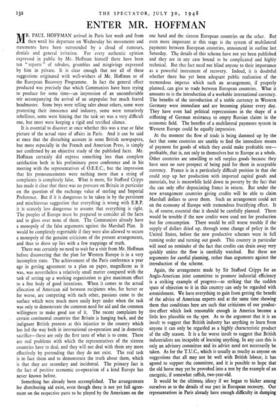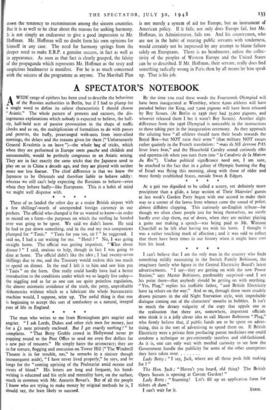ENTER MR. HOFFMAN
It is essential to discover at once whether this was a true or false picture of the actual state of affairs in Paris. And it can be said at once that the disturbing account in some British newspapers, but more especially in the French and American Press, is simply not confirmed by an objective study of the published facts. Mr. Hoffman certainly did express something less than complete satisfaction both in his preliminary press conference and in his meeting with the representatives of O.E.E.C., but the impression that his pronouncements were nothing more than a string of complaints is completely false. What is more, Sir Stafford Cripps has made it clear that there was no pressure on Britain in particular on the question of the exchange value of sterling and Imperial Preference. But if it is dangerous to be taken in by the persistent and mischievous suggestion that everything is wrong with E.R.P. it is scarcely less dangerous to assume that everything is right. The peoples of Europe must be prepared to consider all the facts and to gloss over none of them. The Communists already have a monopoly of the false arguments against the Marshall Plan. It would be completely regrettable if they were also allowed to secure a monopoly of the genuine criticisms of the present arrangements, and thus to dress up lies with a few trappings of truth.
There was certainly no need to wait for a visit from Mr. Hoffman before discovering that the plan for Western Europe is in a very incomplete state. The achievement of the Paris conference a year ago in getting agreement to a plan on paper, magnificent as it was, was nevertheless a relatively small matter compared with the task of setting up a working organisation to give maximum effect to a fine body of good intentions. When it comes to the actual allocation of American aid between recipients who, for better or for worse, are competing with each other, passions come to the surface which were much more easily kept under when the task was only to demonstrate the common need for aid and the common willingness to make good use of it. The recent complaints by certain continental countries that Britain is hanging back, and the indignant British protests at this injustice to the country which has led the way both in international co-operation and in domestic sacrifice—these are only the first taste of what is to come. These are real problems with which the representatives of the sixteen countries have to deal, and they will not deal with them any more effectively by pretending that they do not exist. The real task is to face them and to demonstrate the truth about them, which is that they are secondary and incidental. The primary fact is the fact of positive economic co-operation of a kind Europe has never known before.
Something has already been accomplished. The arrangements for distributing aid exist, even though there is not yet full agree- ment on the respective parts to be played by the Americans on the one hand and the sixteen European countries on the other. But even more important at this stage is the system of multilateral payments between European countries, announced in outline last Saturday. The details of this scheme have not yet been published and they are in any case bound to be complicated and highly technical. But that fact need not blind anyone to their importance as a powerful instrument of recovery. Indeed, it is doubtful whether there has yet been adequate public realisation of the tremendous impetus which such an arrangement, if properly planned, can give to trade between European countries. What it amounts to is the introduction of a workable international currency. The benefits of the introduction of a stable currency in Western Germany were immediate and are becoming plainer every day. They have even had political repercussions in the shape of a stiffening of German resistance to empty Russian claims in the economic field. The benefits of a multilateral payments system in Western Europe could be equally impressive.
At the moment the flow of trade is being dammed up by the fact that some countries are unable to find the immediate means of payment for goods of which they could make profitable use— profitable, that is, not only to themselves but to Europe as a whole. Other countries are unwilling to sell surplus goods because they have seen no sure prospect of being paid for them in acceptable currency. France• is in a particularly difficult position in that she could step up her production with imported capital goods and materials, but is meanwhile held down in poverty by the fact that she can only offer depreciating francs in return. But under the new arrangement countries giving credits will be able to claim Marshall dollars to cover them. Such an arrangement could act on the economy of Europe with tremendous fructifying effect. It is, of course, essential that it should be carefully planned. There would be trouble if the new credits were used not for production but for consumption. There would be still worse trouble if the supply of dollars dried up, through some change of policy in the United States, before the new productive schemes were in full running order and turning out goods. This country in particular will need no reminder of the fact that credits can drain away very quickly unless the flow is carefully watched. But these are arguments for careful planning, rather than arguments against the introduction of the scheme.
Again, the arrangement made by Sir Stafford Cripps for an Anglo-American joint committee to promote industrial efficiency is a striking example of progress—so striking that the sudden spate of objection -to it in this country can only be regarded with astonishment. We have everything to gain from getting the benefit of the advice of American experts and at the same time showing them that conditions here are such that criticisms of our prOduc- five effort which look reasonable enough in America become a little less plausible on the spot. As to the argument that it is an insult to suggest that British industry has anything to learn from anyone it can only be regarded as a highly characteristic product of the silly season. It is a far worse insult to suggest that British industrialists are incapable of learning anything. In any case this is only an advisory committee and its advice need not necessarily be taken. As for the T.U.C., which is usually as touchy as anyone on suggestions that all may not be well with British labour, it has agreed to support the committee, and it is possible to hope that the old horse may yet be provoked into a trot by the example of an energetic, if somewhat raffish, two-year-old.
It would be the ultimate idiocy if we began to bicker among ourselves as to the details of our part in European recovery. Our representatives in Paris already have enough difficulty in damping down the tendency to recrimination among the sixteen countries. But it is as well to be clear about the reasons for seeking harmony. It is not simply an endeavour to give a good impression to Mr. Hoffman. Mr. Hoffman will no doubt form his own opinions for himself in any case. The need for harmony springs from the deeper need to make E.R.P. a genuine success, in fact as well as in appearance. As soon as that fact is clearly grasped, the falsity of the propaganda which represents Mr. Hoffman as the testy and suspicious headmaster is manifest. For he is as much concerned with the success of the programme as anyone. The Marshall Plan is not merely a system of aid for Europe, but an instrument of American policy. If it fails, not only does Europe fail, but Mr. Hoffman, its Administrator, fails too. And his countrymen, who are not in the habit of treating public servants with tenderness, would certainly not be impressed by any attempt to blame failure solely on Europeans. There is no headmaster, unless the collec- tivity of the peoples of Western Europe and the United States can be so described. If Mr. Hoffman, their servant, really does find something radically wrong in Paris then by all means let him speak up. That is his job.



































 Previous page
Previous page